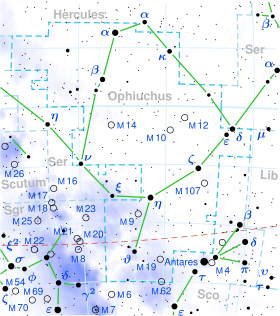心宿增四
外观
| 观测资料 历元 J2000.0 | |
|---|---|
| 星座 | 蛇夫座 |
| 星官 | 心(心宿) |
| 赤经 | 16h 25m 35.11766s[1] |
| 赤纬 | -23° 26′ 49.8150″[1] |
| 视星等(V) | 4.63[2] |
| 特性 | |
| 光谱分类 | B2/3V + B2V[3] |
| U−B 色指数 | -0.56[4] |
| B−V 色指数 | +0.24[4] |
| 天体测定 | |
| ρ Oph AB | |
| 径向速度 (Rv) | -11.40 ± 3[5] km/s |
| 自行 (μ) | 赤经:-5.53[1] mas/yr 赤纬:-21.74[1] mas/yr |
| 视差 (π) | 9.03 ± 0.90[1] mas |
| 距离 | 360 ± 40 ly (110 ± 10 pc) |
| 绝对星等 (MV) | -2.5 ± 0.3[6] |
| 轨道[7] | |
| 主星 | 心宿增四A |
| 伴星 | 心宿增四B |
| 绕行周期 (P) | 2398 ± 326 yr |
| 半长轴 (a) | 4.25 ± 0.79" |
| 偏心率 (e) | 0.675 ± 0.322 |
| 倾斜角 (i) | 135.3 ± 6.0° |
| 升交点黄经 (Ω) | 77.5 ± 13.5° |
| 近心点 历元 (T) | B 2327 ± 343 |
| 近心点幅角 (ω) (secondary) | 226.1 ± 15.3° |
| 轨道[7] | |
| 主星 | 心宿增四D |
| 伴星 | 心宿增四E |
| 绕行周期 (P) | 675.5 ± 32.5 yr |
| 半长轴 (a) | 1.01 ± 0.15" |
| 偏心率 (e) | 0.707 ± 0.112 |
| 倾斜角 (i) | 134.8 ± 2.7° |
| 升交点黄经 (Ω) | 152.7 ± 4.6° |
| 近心点 历元 (T) | B 2008.6 ± 34.2 |
| 近心点幅角 (ω) (secondary) | 260.4 ± 1.1° |
| 详细资料 | |
| 心宿增四A | |
| 质量 | 9.6[8] M☉ |
| 半径 | 8.5 ± 1[9] R☉ |
| 亮度 | 13000[9] L☉ |
| 温度 | 21900[8] K |
| 自转 | 1.205 d[9] |
| 自转速度 (v sin i) | 240 ± 10[9] km/s |
| 心宿增四B | |
| 质量 | 8[10] M☉ |
| 心宿增四C | |
| 质量 | 5[10] M☉ |
| 心宿增四D | |
| 质量 | 3.06[7] M☉ |
| 心宿增四E | |
| 质量 | 1.97[7] M☉ |
| 其他命名 | |
| 参考数据库 | |
| SIMBAD | 心宿增四 |
| 心宿增四A | |
| 心宿增四B | |
| 心宿增四C | |
| 心宿增四D/E | |
心宿增四(蛇夫座ρ)是星座蛇夫座中的多星系。中心系统的视星等为4.63等[2]。根据中央系统视差的 9.03 mas[1],它位于大约360光年(110秒差距)之外[1],而该系统中的其它恒星距离稍远[11]。
系统
[编辑]
中心的一对联星被称为心宿增四AB(蛇夫座ρAB)。它由至少两颗蓝色的次巨星或主序星组成,分别命名为心宿增四A和B[11]。心宿增四AB 是目视联星,两颗恒星之间的角距离在天球投影距离似乎是3.1角秒,对应于至少 344 天文单位的间隔[11]。然而,实际的间隔更大,处(至少17,000天文单位),并被称为心宿增四C[11]。HD 147888相距2.82角分(至少19,000天文单位),并被称为心宿增四DE[11]。恒星C和D两者都是B型主序星[11],D 本身是另一对联星,其轨道互绕周期为680年[7]。
星云复合体
[编辑]这个星云复合体依据蛇夫座ρ命名命名为蛇夫座ρ星云复合体。它是一个由气体和尘埃组成的星云,而心宿增四,即蛇夫座ρ系统嵌入其中。它是最容易观察到的恒星形成区域之一,因为它是最近的区域之一,而且从两个半球都可以看到[12]。
心宿增四的消光(AV)被量测为1.45星等,这意味着心宿增四前方的尘埃和气体吸收了来自该系统的光,使其看起来比没有尘埃或气体时暗1.45星等[13]。此外,气体和尘埃还会散射更多高频光,使光看起来更红。星际红化(EB−心宿增四的 V) 已被测量为 0.47 星等[6]。
参考资料
[编辑]- ^ 1.0 1.1 1.2 1.3 1.4 1.5 1.6 van Leeuwen, F.; et al. Validation of the new Hipparcos reduction. Astronomy and Astrophysics. 2007, 474 (2): 653–664. Bibcode:2007A&A...474..653V. S2CID 18759600. arXiv:0708.1752
 . doi:10.1051/0004-6361:20078357.
. doi:10.1051/0004-6361:20078357.
- ^ 2.0 2.1 Ducati, J. R. VizieR Online Data Catalog: Catalogue of Stellar Photometry in Johnson's 11-color system. VizieR Online Data Catalog. 2002, 2237. Bibcode:2002yCat.2237....0D.
- ^ Houk, N.; Smith-Moore, M. Michigan Catalogue of Two-dimensional Spectral Types for the HD Stars. Volume 4, Declinations −26°.0 to −12°.0. 1988. Bibcode:1988mcts.book.....H.
- ^ 4.0 4.1 Nicolet, B. Catalogue of homogeneous data in the UBV photoelectric photometric system. Astronomy and Astrophysics Supplement Series. 1964, 34: 1–49. Bibcode:1978A&AS...34....1N.
- ^ Gontcharov, G. A. Pulkovo Compilation of Radial Velocities for 35 495 Hipparcos stars in a common system. Astronomy Letters. 2006, 32 (11): 759–771. Bibcode:2006AstL...32..759G. S2CID 119231169. arXiv:1606.08053
 . doi:10.1134/S1063773706110065.
. doi:10.1134/S1063773706110065.
- ^ 6.0 6.1 Wegner, W. The total-to-selective extinction ratio determined from near IR photometry of OB stars. Astronomische Nachrichten. 2003, 324 (3): 219–237. Bibcode:2003AN....324..219W. doi:10.1002/asna.200310081.
- ^ 7.0 7.1 7.2 7.3 7.4 Novaković, B. Orbits of Five Visual Binary Stars. Baltic Astronomy. 2007, 16: 435–442. Bibcode:2007BaltA..16..435N. arXiv:0712.4242
 .
.
- ^ 8.0 8.1 Hernández, Jesús; Calvet, Nuria; Hartmann, Lee; Briceño, César; Sicilia-Aguilar, Aurora; Berlind, Perry. Herbig Ae/Be Stars in nearby OB Associations. The Astronomical Journal. 2005, 129 (2): 856–871. Bibcode:2005AJ....129..856H. S2CID 17672346. arXiv:astro-ph/0410494
 . doi:10.1086/426918.
. doi:10.1086/426918.
- ^ 9.0 9.1 9.2 9.3 引用错误:没有为名为
Hubrig的参考文献提供内容 - ^ 10.0 10.1 Allen, Christine; Ruelas-Mayorga, Alex; Sánchez, Leonardo J.; Costero, Rafael. The dynamical evolution of multiple systems of trapezium type. Monthly Notices of the Royal Astronomical Society. 2018. arXiv:1809.03537
 . doi:10.1093/mnras/sty2502
. doi:10.1093/mnras/sty2502  .
.
- ^ 11.0 11.1 11.2 11.3 11.4 11.5 Cordiner, M. A.; Fossey, S. J.; Smith, A. M.; Sarre, P. J. Cordiner, M. A., Fossey, S. J., Smith, A. M. and Sarre, P. J. 2013, ApJ, 764, L10. The Astrophysical Journal Letters. 2013, 764 (1): L10. Bibcode:2013ApJ...764L..10C. S2CID 119204101. arXiv:1301.6167
 . doi:10.1088/2041-8205/764/1/L10.
. doi:10.1088/2041-8205/764/1/L10.
- ^ Wilking, B. A.; Gagné, M.; Allen, L. E. Star Formation in the ρ Ophiuchi Molecular Cloud. Handbook of Star Forming Regions. 2008. Bibcode:2008hsf2.book..351W. arXiv:0811.0005
 .
.
- ^ Shatsky, N.; Tokovinin, A. The mass ratio distribution of B-type visual binaries in the Sco OB2 association. Astronomy and Astrophysics. 2002, 382: 92–103. Bibcode:2002A&A...382...92S. S2CID 16697655. arXiv:astro-ph/0109456
 . doi:10.1051/0004-6361:20011542.
. doi:10.1051/0004-6361:20011542.

